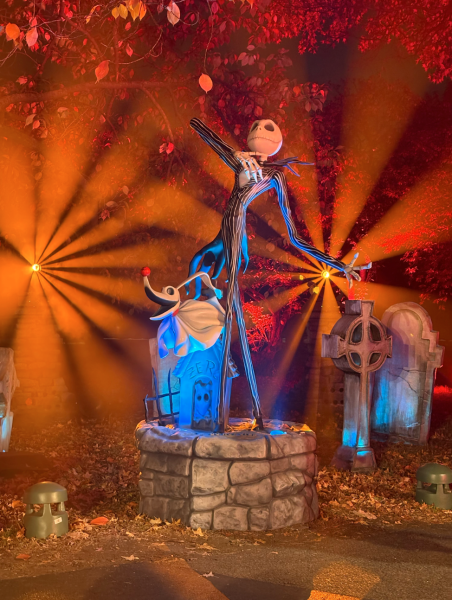“Moon Knight” Explores the Complexities of DID
In Marvel’s newest series Oscar Isaac plays two characters, Marc Spector and Steven Grant. (Courtesy of Twitter)
Marvel’s newest series “Moon Knight” stars Oscar Isaac as a character whose dissociative identity disorder (DID) forces him to live the dual life of Marc Spector and Steven Grant. The series, dating back to the 1975 Marvel comic books, portrays Marc Spector as the charming and serious Moon Knight who serves as an avatar for the Egyptian moon god, Khonshu. Contrastingly, Spector’s alter, Steven Grant, is an average museum gift shop employee, consumed by his appreciation for Egyptian history and culture. Filled with action, humor and moral dilemma, the series uncovers a dark mystery that requires the two characters to negotiate their differences.
The series begins when Grant wakes up one night in the Australian Alps to find the antagonist of the film, Arthur Harrow. Harrow is leading a cult on a quest for a scarab that acts as a compass to the Tomb of Ammit, an Egyptian Goddess who rivals Khonshu. Notable throughout the series is the presence of Egyptian mythology, which sparked my own curiosity. With rich symbolism and fascinating sets, the series offers alluring imagery primarily shot across Budapest, Hungary, Slovenia and Jordan, with scenes utilizing special effects to make the plot come to life. It’s also interesting to also note the great lengths the producers of the series go to achieve an authentic representation of Egyptian culture, with director Mohamed Diab hiring composer Hesham Nazih, editor Ahmed Hafez and 90 percent of the Egyptian roles going to the fellow countrymen.
The following episodes unravel the rivalry between Harrow and Spector/Grant as they compete to find Ammit’s tomb. Aside from their mission, the series follows a variety of conflicting relationships, the greatest of which existing within Grant and Spector. The internal conflict faced by Grant as he realizes his obligation to become the Moon Knight is portrayed both seriously and comically. Grant must navigate Spector’s complicated love life, unlocks his physical potential and bravely carries on a mission that disrupts his otherwise mundane lifestyle.
This of course challenges Grant’s own sense of morality, as he must risk his own life and the lives of others on the quest to ultimately do good. The question of morality becomes a central focus of the series, with the goddess Ammit acting as a “personification of divine retribution,” that deemed souls worthy or unworthy based on their past or future actions. While Grant is tasked with reckoning his own morality, the audience is also encouraged to ponder how the the worthiness of another is weighed in theory and in our own reality.
When I first learned of the premise, I was skeptical to how a superhero plot can be created around a mental illness. The series indicated that Spector faced a traumatic childhood paired with his work in the U.S. Marine Corps as a mercenary. Although, not yet discussed in the series, the comics suggest that Spector had additionally discovered that a close family friend carried out multiple antisemitic murders as a Nazi. This knowledge led to Spector’s DID development to dissociate from his trauma. The portrayal of DID appears both accurate in some instances and misinformation in others. For Grant, there is paranoia associated with DID that induces great anxiety. Each night, Grant lays a circle of sand around his room, places tape down his door frame and locks his foot to the end of his bed, all to monitor himself and his surroundings. However, at other points in the series, the DID inaccurately portrays Spector and Grant’s ability to switch their personalities on command. The two can stay in constant communication through the passage of mirrors and reflections. When Grant makes decisions unfavorable to Spector, Spector finds ways to convince Grant into switching identities and allowing Spector to gain control and become the Moon Knight. The ability to switch alters becomes a strength in the characters’ collaboration and is tied to their supernatural abilities.
While DID does not appear to operate with such control and benefit, the series still offers commentary on the strain and paranoia authentic to this mental illness.
While the Moon Knight holds supernatural abilities prominent to many of Marvel’s superheroes, the characters of Spector and Grant often rely on their skills culminated through advanced physical training, historical knowledge and bravery. Like other hero premises, “Moon Knight” depicts both Marc Spector, and Steven Grant, as regular people compelled into supernatural situations.
Grant’s naivety surrounding combat and moral unwillingness to wrong feels relatable to most of the audience, making his initial battles both cringe-worthy and humorous. Yet, Grant’s continued ability to trust in his knowledge and physical power creates a favorable hero who we continue to see advance through each episode. While only four episodes are currently available, the series is set for a thrilling season.











































































































































































































